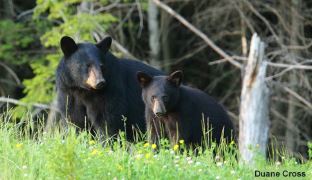CONCORD, N.H. - Fish and Game officials say that despite the passing of the peak season for bear-human interaction, the danger of unwanted confrontations remain.
Despite the seasonal change in the air with fall approaching, N.H. Fish and Game and the U.S. Forest Service urge homeowners, campers, and the rest of the public to continue to be vigilant and responsible in bear country.
The peak period of conflicts between bears and humans is June and July, however, bear activity in and around human-occupied areas can continue through August and occasionally September.
This time period coincides with the peak tourist season and a time when a lot of residents and visitors are recreating outside in bear habitat. "Campgrounds are full, restaurant dumpsters are overflowing, and human-related food attractants remain highly abundant across the landscape. When these conditions exist, bears will exploit these feeding opportunities," said Andrew Timmins, bear biologist with NH Fish and Game.
The root cause of most (approximately 86%) annual bear-human conflicts is birdfeeders, garbage and inadequately secured chickens. Despite ongoing educational efforts, these attractants remain numerous on the landscape, thereby perpetuating conflicts. August represents a period when campgrounds, particularly in the White Mountains are busy, which can result in conflicts. When camping, it is critical that all foods be stored so that bears cannot gain access. Foods left on picnic tables and in coolers at the campsite are easy targets. Bears quickly learn that their mere presence causes campers to move away, making these attractants easily attainable.
Overall, bear-human conflicts have been below average this summer, according to Timmins. "Conflicts, both in residential areas and in the White Mountains National Forest, have been much less frequent as compared to previous years and particularly down from 2016 levels," he said. "This decrease is the result of an increase in the abundance of natural foods this summer and the good efforts of the public at being more proactive in avoiding conflicts. Despite this decrease in bear-human conflicts, we continue to urge folks to remain focused on managing food attractants when living or recreating in bear country."
Campers and hikers can avoid conflicts with bears by maintaining a clean campsite and storing food, garbage and aromatic items, such as toothpaste and other toiletries, out of reach of bears (not in your tent!) If car camping, keep all food and coolers in a building or vehicle with the windows closed. If camping at a remote site, bring rope to properly hang these items, or use bear-resistant canisters, available for rent at no charge at all White Mountain National Forest Ranger Districts offices (www.fs.usda.gov/whitemountain).
Fish and Game recommends that people take the following action to reduce the chances of a bear visiting your home or campsite:
- Stop all bird feeding by April 1, or as soon as snow melts.
- Clean up any spilled birdseed and dispose of it in the trash.
- Secure all garbage in airtight containers inside a garage or adequate storage area, and put garbage out on the morning of pickup, not the night before.
- Avoid putting meat or other food scraps in your compost pile.
- Don't leave pet food dishes outside overnight.
- Clean and store outdoor grills after each use.
- Do not leave food, grease or garbage unsecured around campsites.
- Store food and coolers in a closed vehicle or secured area while camping.
- Finally, never intentionally feed bears!
Anyone with questions can get advice by calling a toll-free number coordinated jointly by the U.S. Department of Agriculture's Wildlife Services and the New Hampshire Fish and Game Department: 1-888-749-2327 (1-888-SHY-BEAR).














